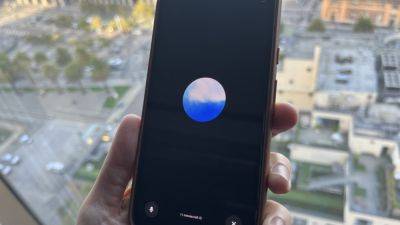Hands-on with Meta's Orion AR glasses prototype and the possible future of computing
The most impressive aspect of Meta's Orion augmented reality glasses has more to do with size and comfort than flashy computer graphics.
CNBC senior media and tech correspondent Julia Boorstin was able to use Orion this week at Meta's annual Connect conference, and she was captivated by the prototype's compact form relative to the various Meta Quest and Apple Vision Pro virtual reality headsets.
"What was really striking to me about these was that they were incredibly lightweight," Boorstin said.
Meta CEO Mark Zuckerberg revealed the Orion glasses on Wednesday and pitched them as "a glimpse of a future that I think is going to be pretty exciting." The glasses are black and thick framed and come with a wireless "puck" that allows the device to run apps like a holographic game of digital chess or pingpong that appear as digital graphics spliced into the real world.
The experimental glasses are part of Zuckerberg's multibillion-dollar plans to build the next generation of personal computing for the so-called metaverse, a term used by Meta to describe people interacting with one another online in virtual 3D spaces.
While Orion is not capable of putting users in fully virtual worlds, the glasses can overlay digital graphics onto the real world. And unlike VR headsets that can be cumbersome to wear for extended periods, Boorstin said she found the Orion glasses to be a good fit.
"The form factor didn't feel meaningfully different than wearing a pair of heavy, ordinary glasses, and they were not uncomfortable to wear," she said.
Though the current incarnation of the Orion AR glasses could pass as a movie prop for the film "Revenge of the Nerds," Boorstin said she believes they're only going to get smaller as technology improves.
"This







